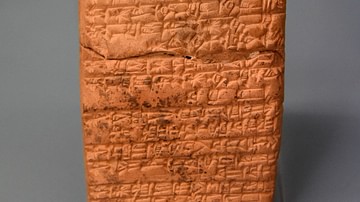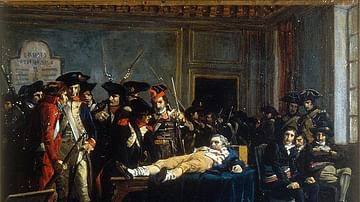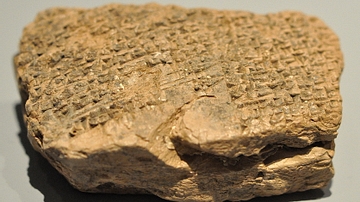Search
Search Results

Image
Year Formulae of King Shulgi of Ur
Terracotta tablet listing the year formulae of King Shulgi of Ur. From Southern Mesopotamia, modern-day Iraq, Ur III period, 2094-2047 BCE.
Ancient Orient Museum, Istanbul.

Image
Morning of 10 Thermidor Year II
The Morning of 10 Thermidor Year II depicts a wounded Maximilien Robespierre on the last morning of his life, jaw shattered, lying on the centered table. He and his allies would be executed later that day. Oil on canvas by Lucien-Étienne...

Image
Four Coffins of the Victims of the Boston Massacre
A newspaper clipping from the Boston Gazette reporting on the funeral of four of the victims of the Boston Massacre, represented by an image of four coffins, each bearing the initials of a victim. These names from left to right include: Samuel...

Definition
French Republican Calendar
The French Republican calendar, also known as the French Revolutionary calendar, was created during the French Revolution (1789-1799) in an attempt to build a new society separate from the vestiges of the Ancien Régime. First implemented...

Image
Three Kingdoms Period of China and the Rise of Xianbei in the year 229 CE
This map depicts the boundaries of all major civilizations in East Asia at the beginning of the Three Kingdoms Period of China, with italics indicating nomadic bands and other tribal societies. Following the collapse of Han Dynasty in 220...

Image
East Asia in the year 1 CE
This map shows the boundaries of all major civilizations in East Asia at the beginning of the first millennium, with italics indicating nomadic bands and other tribal societies.

Image
Formulas for Year Names of the Kings of Ur
This fragment of a clay tablet mentions certain formulas of naming years depending on major historical events. From Mesopotamia, modern-day Iraq. Early dynastic period, 2800-2300 BCE. The Sulaimaniya Museum, Iraq.

Image
Map of the Four Khanates of the Mongol Empire, c. 1300
This map illustrates the four major khanates that emerged from the Mongol Empire in the early 14th century, following the fragmentation of the vast domain once ruled by Genghis Khan (circa 1162 to 1227, reign 1206 to 1227). Although no longer...

Image
Four Khanates of the Mongol Empire
A map of the four Khanates of the Mongol Empire, after its division in 1259 CE.

Image
Our Lady of Guadalupe and the Four Apparitions
The Virgin of Guadalupe with the Four Apparitions, painting by Nicolás Enríquez, Mexico, 1773. This image depicts Our Lady of Guadalupe, an image of the Virgin Mary specific to Mexico/New Spain and her four apparitions in December of 1531...